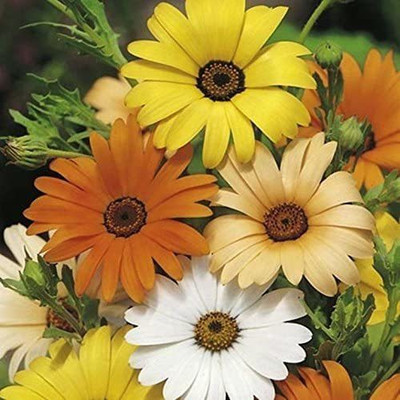CYBEXIS African Daisy Seeds - Mix Seed(1 g)
Quick Overview
Product Price Comparison
Daisy is a winter flower that blooms in an array of shades. It is a dwarf, dense flowering plant that serves well as pot plants and flower beds. Daisies belong to the daisy family of Compositae, now known as Asteraceae in flowering plants. Daisies are native to north and central Europe. Daisies are an easy to grow perennial, that brightens the flower garden, and is great for indoor vases and arrangements. While there are dozens of varieties of daisies, the most popular are the Shasta Daisy, Painted Daisy, and African Daisies. Daisies like rich, well drained soil and full sunshine. They will readily tolerate poorer soils and partial shade as well. Daisies are among the most popular of flowers of both gardeners and non-gardeners. These flowers are also known to be the best for kids and beginners. Daisy is not only a beautiful ornamental addition to your home but its leaves are edible and can make a tasty companion to your salads. They are closely related to artichoke and are high in Vitamin C. Daisies also have lots of medicinal properties along with beauty.PLANTING INSTRUCTIONSSoil should be collected in a garden pot mixed with well rotten cow dung or manure.Broadcast the seeds over the soil bed and cover it with a thin layer of sieved sand to allow germination.Maintain a distance of 1.0 feet between the plants.Sprinkle little water and then as per requirement keeping the soil moist.Flowering starts after 45-50 days post transplant which continues for 100-120 days depending on the variety.GROWING REQUIREMENTSPESTSMarigolds are susceptible to damping off (Rhizoctonia solani) and pests like collar rat, Sclerotium rolfsii, Botrytis cinerea, Powdery mildew and cucumber mosaic. The major symptom for these pests is light brown spots on the lower leaves or on early seedlings. To prevent these diseases, ensure proper drainage and ventilation and avoid over watering.SOILSandy loamy soil with pH 5.6 to 6.5 is ideal for its cultivation.SPOTPlace in a spot that receives either full sun or partial sunlight.TEMPERATURE20-25┬░CWATERINGRegular watering keeps the flowers healthy. You can use a water can or a water spray.HOW TO HARVESTFor harvesting marigold, loose flowers are plucked when they attain full size depending upon the variety. Flowers should generally be harvested in the morning hours. Irrigation of soil with water,before plucking, gives better flower quality. Also, plucking of flowers regularly and removal of dried flowers enhances the yield.


